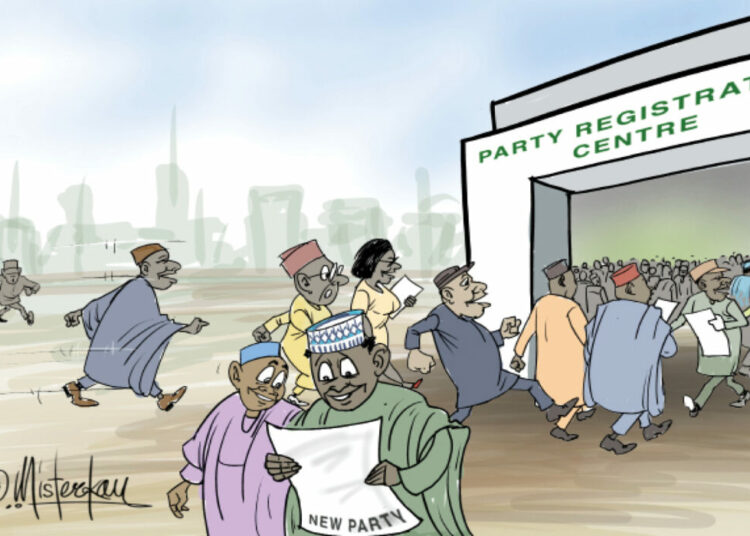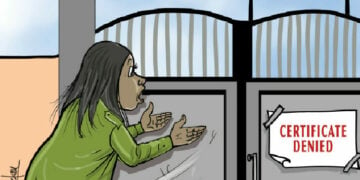The 2027 general elections are fast approaching, and Nigeria’s political landscape is undergoing a rapid transformation. New acronyms, and freshly minted party logos are emerging, promising a new era of renewal and liberation. To the casual observer, this may seem like democracy in full bloom—citizens exercising their right to association, political diversity flourishing, and the marketplace of ideas expanding. However, beneath this surface, a more urgent reality is unfolding. The current rush to establish new parties is less about ideological conviction or grassroots movements and more about strategic positioning, bargaining leverage, and transactional gain.
It is the paradox of Nigerian politics: proliferation as a sign of vitality, proliferation as a symptom of democratic fragility. With 2027 on the horizon, the political air is electric, not with fresh ideas, but with a gold rush to create new political parties. Supporters call it the flowering of democracy. But scratch the surface and you see something else: opportunism dressed as pluralism. This is not just politics — it is political merchandising. Parties are being set up like small businesses, complete with negotiation value, resale potential, and short-term profit models. Today, Nigeria has 19 registered political parties, one of countries with the highest no of registered political parties in the world behind India (2500) and Brazil (35) and more than Indonesia (18).
Here we are again, with Nigeria’s Independent National Electoral Commission (INEC) registering nineteen parties but facing an avalanche of new applications—110 by late June 2025, swelling to at least 122 by early July. This surge is striking, especially considering that after the 2019 general elections, INEC deregistered seventy-four parties for failing to meet constitutional performance requirements, a decision upheld by the Supreme Court in 2021. That landmark ruling underscored that party registration is not a perpetual license; it is a privilege conditioned on meeting electoral benchmarks, such as a minimum vote share and representation across the federation. The surge in party formation could potentially lead to a more complex and fragmented electoral process, making it harder for voters to make informed decisions and for smaller parties to gain traction.
Party Formation As An Enterprise
So, what explains the surge in the formation of new parties now? The reasons are not mysterious. Money is the bluntest answer, but it is braided with other motives. For some, creating a party is a strategic move to position themselves for negotiations with larger parties—trading endorsements, securing “alliances,” and even extracting concessions like campaign funding or political appointments. Others set up “friendly” parties designed to dilute opposition votes in targeted constituencies, often indirectly benefiting the ruling party. Some political entrepreneurs build parties as personal vehicles for regional ambitions or as escape routes from established parties where rival factions have captured the leadership. Some are escape pods for politicians frozen out of the ruling APC’s machinery. There is also a genuine democratic impulse among certain groups to create platforms for neglected ideas or underrepresented constituencies. But the transactional motive often eclipses these idealistic efforts, leaving most new parties as temporary instruments rather than enduring institutions.
The democratic consequences of this kind of proliferation are profound. On the one hand, political pluralism is a constitutional right and an essential feature of democracy. On the other hand, too many weak, poorly organised parties can fragment the opposition, confuse voters, and degrade the quality of political competition. Many of these micro-parties lack ward-level presence, a consistent membership drive, and ideological coherence. Their manifestos are often generic, interchangeable documents crafted to meet registration requirements rather than to present a distinct policy vision. On election day, their presence on the ballot can be more of a distraction than a contribution, and after the polls close, many vanish from public life until the next cycle of political registration. This is not democracy — it is ballot clutter.
Lessons From Global Democracies
This is not uniquely Nigerian. In India, a few thousand registered parties exist, yet only a fraction of them is active or competitive at the state or national level. Brazil, notorious for its highly fragmented legislature, has struggled with unstable coalitions and governance deadlock; even now, it is reducing the number of effective parties. Indonesia allows many parties to register but imposes a parliamentary threshold—currently four per cent of the national vote—to limit legislative fragmentation. These examples, along with others from around the world, suggest that plurality can work, but only when paired with guardrails: stringent conditions for registration, clear criteria for participation, performance-based retention, and an electoral culture that rewards sustained engagement over fleeting visibility.
Nigeria already has a version of this in place, courtesy of INEC’s power to deregister. We deregistered seventy-four parties in 2020 for failing to meet performance standards, and five years later, we are sprinting back to the same cliff. Yet loopholes remain especially, and the process is reactive rather than proactive. Registration conditionalities are lax. This is where both INEC and the ruling APC must shoulder greater responsibility. The need for electoral reform is urgent, and it is time for all stakeholders to act.
For INEC, the task is to strengthen its oversight by tightening membership verification, enhancing financial transparency, and expanding its geographic spread requirements, as well as introducing periodic revalidation between election cycles. For the ruling party, the challenge lies in upholding political ethics: resisting the temptation to exploit party proliferation to splinter the opposition for short-term gain. A strong ruling party in a democracy wins competitive elections, not one that manipulates the field to run unopposed. Strong democracy requires a credible opposition, not a scattering of paper platforms that cannot even win a ward councillor seat.
Balancing Freedom And Order
Here is the truth: this system needs reform. Reform doesn’t mean closing democratic space, but making it meaningful and orderly. Democracy must balance full freedom of association with the need for order. While freedom encourages many parties, order requires limiting their number to a manageable level.
For example, Nigeria could require parties to have active structures in two-thirds of states, a verifiable membership, and annual audited financials. Parties failing to win National Assembly seats in two consecutive elections could lose registration. The message to new parties is clear: prove you’re more than just a logo and acronym. Build lastingmovements—organise locally, offer real policies alternatives, and stay engaged between elections.
Ultimately, the deeper issue here is the erosion of public trust. Nigerians have no inherent hostility to new political formations; what they distrust are political outfits that emerge in the months leading up to an election, strike opaque deals, and disappear without a trace. Politicians must resist the temptation to treat politics as a seasonal business opportunity and instead invest in it as a long-term public service.
As 2027 approaches, Nigeria stands at a familiar but critical juncture. The country can indulge the frenzy—rolling out yet another logo, staging yet another press conference, promising yet another “structure” that exists mainly on paper. Or it can seize this moment to rethink how political competition is structured: open but disciplined, plural but purposeful, competitive but coherent. Fewer parties will not automatically make Nigeria’s democracy healthier. But better parties—rooted in communities, committed to clear policies, and resilient beyond election season—just might. And that is a choice within reach, if those who hold the levers of power are willing to leave the system stronger than they found it.











